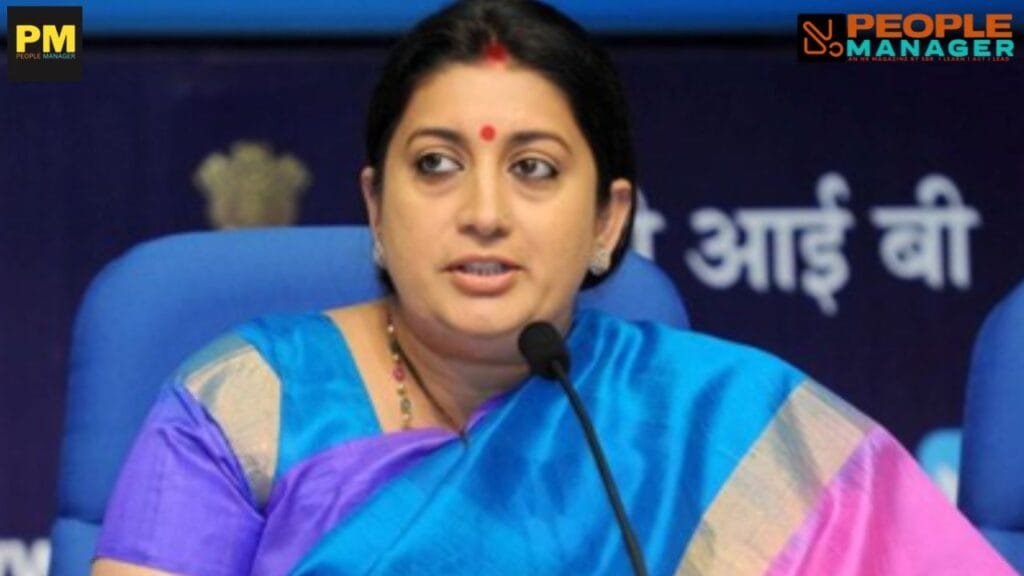No Need for “Paid Menstrual Leave’ Policy : Smriti Irani
Irani was responding in the Rajya Sabha to a query regarding the nation's menstrual hygiene policy posed by Manoj Kumar Jha, a member of the Rashtriya Janata Dal (RJD) in the upper house.

There is no need for the ‘Paid Menstrual Leave’ policy; Menstruation, not handicap, is the natural routine in women’s lives, Minister Smriti Irani stated
Menstruation is not a “handicap,” according to Union of Women and Child Development (WCD) Minister Smriti Irani, who stated on Wednesday that there should be no special rules for “paid leave” because of it.
Irani was responding in the Rajya Sabha to a query regarding the nation’s menstrual hygiene policy posed by Manoj Kumar Jha, a member of the Rashtriya Janata Dal (RJD) in the upper house.
“Being a woman who experiences menstruation does not make me less of a person; rather, it is a normal aspect of a woman’s life path. She stated, “We should not bring up issues where women are denied equal opportunities simply because someone who does not menstruate has a certain opinion about menstruation.”
Irani informed the Lok Sabha last week that there is “no proposal under the consideration of the government to make provision for paid menstrual leave mandatory for all workplaces” in response to a question posed by Congress MP Shashi Tharoor.
Irani stated that “a small proportion of women and girls suffer from severe dysmenorrhea or similar complaints, and most of these cases are manageable by medication” in a written response that was submitted to the upper chamber on Wednesday.
However, the topic of menstruation and the activities that go along with it are taboo, frequently treated with shame, and shrouded in silence. As a result, menstruating people’s freedom, mobility, and access to normal activities are restricted, which frequently results in harassment and social exclusion. When a girl or person who is menstruation is unaware of the changes she experiences on an emotional and physical level when she experiences her menstrual cycle for the first time, it becomes even more delicate, the respondent stated.
Notably, the government proposed leave arrangements for menstruation individuals in workplaces in a draft Menstrual Hygiene Policy that was released in October. “Workplaces and educational institutions should encourage diversity, acknowledge the varied requirements of employees, and cultivate an atmosphere that enhances each person’s productivity and well-being. Provisions include flexible work schedules, such as support leave or work-from-home options, to meet the unique demands of each person during their menstrual cycle.
To avoid maintaining stigmas or presumptions about productivity based on menstrual cycles, it is crucial to stress that such arrangements should be accessible to everyone, the draft said.
Jha also asked about the rules governing sanitary napkins and expressed worries about possible hazards related to certain compounds used in their production.
In response, Irani remarked, “Through 10,000 Jan Aushadi Kendra, sanitary napkins are available at 1 rupee, and there has been no complaint.” She further highlighted the accessibility of sanitary napkins at reasonable prices through this program.
“In 2014, after Modi Sarkar, the Jal Shakti ministry started with national and state protocols for the management of sanitary products,” stated Irani regarding the disposal of sanitary products.
The ministry outlined many government-initiated programs for menstrual hygiene in her written answer. It said that the government is promoting menstrual hygiene among teenage girls between the ages of 10 and 19 through a number of initiatives.
“State Program Implementation Plans are used to carry out the National Health Mission-backed Scheme for Promotion of Menstrual Hygiene, which aims to increase awareness. The Ministry of Drinking Water and Sanitation has also created National Guidelines on Menstrual Hygiene Management for Rural Areas under the Swachh Bharat Abhiyan, she added.
Value our content… contribute towards our growth. Even a small contribution per month would be of great help to us. Since our establishment, we have been serving the industry through daily news and updates.
Our content is free for all, and we plan to keep it that way
Support the People Manager. Pay Here (All it takes is a minute)
- Pernod Ricard India introduces Cheers VRorld, an industry-first VR-powered onboarding experience in the Alco-Bev sector - February 11, 2026
- Jio-bp Appoints Sareeta Bhatikar as Chief Human Resources Officer to Steer Next Phase of Growth - February 11, 2026
- India Keeps Hiring as Global Markets Slow: Michael Page India Salary Report-26 - February 6, 2026







